IN THIS ISSUE
PROFESSIONAL LEARNING
THE SCHOOL MUSICAL – HEAVEN OR HADESTOWN? ASME



PROFESSIONAL LEARNING
THE SCHOOL MUSICAL – HEAVEN OR HADESTOWN? ASME


I extend a warm welcome to all of you in the pages of the SA Music Teacher Magazine. Recently we celebrated the remarkable success of our second Concert Performance Day, a momentous event that showcased the extraordinary talent of our students and highlighted the dedication of our members.
The overwhelming attendance and popularity of our Concert Performance Day were awe-inspiring. The event brought together students from across the state, demonstrating the significant impact our association has on the music education community. Witnessing the enthusiasm and passion of these young musicians was a testament to the hard work and commitment of our members in nurturing their talents. It was evident that the students have been under the guidance of exceptional educators, and the progress they have made is a testament to the high standards to which MTASA holds dear.
We now look forward eagerly to the next student performance opportunity, with the Miriam Hyde Award - Competition Day, being held on Saturday 16 September, Hartley Concert Room, University of Adelaide. You can enter your students through our website.


As music teachers, we understand the importance of continuous Professional Learning. It is a journey that never truly ends, as we constantly seek to improve and refine our craft. MTASA is committed to providing opportunities for both instrumental music teachers and classroom music teachers to engage in ongoing professional development. By staying updated with the latest pedagogical approaches, technology, and teaching methodologies, we ensure that our students receive the best education possible.
Looking ahead, we cannot contain our excitement as we begin preparations for the upcoming January Summer Conference. This two-day event promises to be a highlight in our association’s calendar, with a lineup of esteemed international and interstate speakers. The conference will be an invaluable platform for knowledge exchange and networking opportunities. The highquality professional development sessions on offer are not to be missed, and we are confident that it will further elevate the standard of music education.
I extend my sincerest gratitude to all MTASA members for their unwavering dedication and contribution to the music education community. It is through our collective efforts that we continue to shape the future of music education and inspire generations to come. Let us celebrate the achievements of our students and strive to enhance our skills and knowledge as educators.
Sofie Arhontoulis, President MTASA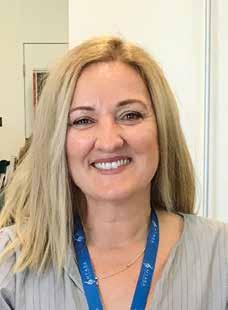
PATRONS : Dr Doreen Bridges AM, Emeritus Professor David Lockett AM, Her Excellency the Honourable Frances Adamson AC, Governor of South Australia and Mr Rod Bunten
PRESIDENT : Sofie Arhontoulis
VICE-PRESIDENT : Rodney Smith, Wendy Heiligenberg
SECRETARY : Elena Shakallis
TREASURER : Samantha Penny
AUDITOR : Australian Independent Audit Services
COUNCIL 2022/2023 : Sofie Arhontoulis, Pete Barter, David Brookes, Wendy Heiligenberg, Masako Kondo, Kathleen Lawler, Zuoyu Liu, Yong Cheong Lye, Yuxin Men, Anthea Mur, Samantha Penny, Elena Shakallis, Rodney Smith, Michael Thompson
EDITOR : Masako Kondo
LAYOUT : Sectrix
MEMBERSHIP ENQUIRIES to the SecretaryPO Box 4, RUNDLE MALL, SA 5000 Mobile: 0402 575 219
E-mail: info@mtasa.com.au
ADVERTISING - please contact the Secretary
Please see MEMBER INFORMATION page for Advertising Price List.
DEADLINES FOR 2023/2024
Contributions to SA Music Teacher are most welcome. All items to be included must reach the Editor (info@mtasa.com.au) no later than these deadlines:
Friday October 27, 2024 - Friday 26 January, Friday 26 April, Friday 19 July.
SOME CONTRIBUTING GUIDELINES
All text is to be submitted to the Editor for review.
Italics and inverted commas for quotations - text is to be either in Italics or inside inverted commas, not both.
Single inverted commas to be used; double inverted commas only inside single inverted commas.
The inverted comma at the end of a sentence is to be inside the fullstop; outside for ! and ?
MTASA WEBSITE
Please visit mtasa.com.au
MTASA FACEBOOK
Please visit the MTASA Facebook page at www.facebook.com/MusicTeachersSA/

Saturday, 16 September
Competition Day (Miriam Hyde Awards)
Venue
Time Ticket
Hartley Concert Room, The University of Adelaide
9 am (Junior) and 1 pm (Open)
Via website
Sunday, 12 November
AGM
Venue
Time Ticket
St Spyridon College
5:30 pm
Via Website
18 & 19 January, 2024
Summer Conference 2024 – 21st Century Music Studio
Venue
Time Ticket
Prince Alfred College
Registration 8:30 am
Via Website

The Music Teachers’ Association extends a warm welcome to the following music teachers who have joined the association. We are looking forward to meeting them at our events.
Anne Mathews, Student, Piano
Cathy Miegel, Full, Piano, Theory
Li Shan Xiao, Full, Piano
Rui (Mandy) Man, Violin
Qiyue Feng, Full, Piano
Gabriel Benedito, Full, Guitar, Drums, Singing and Theory
Michael Thompson, Friends
MEMBER NEWS:
Alison Hams
It’s been a big year for MTASA member ALISON HAMS.
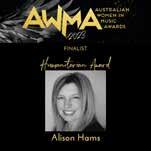
Hot on the heels of her successful return to the commercial recording industry with new album “OUT INTO THE BLUE” (with husband and musical partner Mark Tempany) and a huge response from Australian Radio for their Lead Single “LULLABY” - Whyalla singer/songwriter and Music Educator Alison Hams has today been announced as a TOP 3 Finalist in the “Humanitarian Award” category of the 2023 AUSTRALIAN WOMEN IN MUSIC AWARDS (AWMA).
The “Humanitarian Award” recognises an individual (female, male and GNC) who has made a significant and lasting contribution to the field of music education, and/or assisting female artists working in remote and/or regional communities.
Alison has been previously lauded for her long-standing role in Music Education and Philanthropy, including taking home the “Best Music Educator” Award at the 2021 SOUTH AUSTRALIAN MUSIC AWARDS, and being inducted onto the “SA Women’s Honour Roll” by the Governor of South Australia.
The membership fees are:
Full member $125
Associate (continuing only) $115

Student member $62
Friend $33
Institution $33
The following teaching rates are recommended to members by the MTASA Council for 2023.
Full Member - $80 per hour
Student Member - $55 per hour
Membership Subscription Renewals for 2023/2024 was due on June 30.
Subscription renewal notices were sent in late June via e-mail to remind members to log in and renew their membership for the 2023/2024 financial year. If you are a Full member you will be asked to indicate that you have completed seven hours of Professional Development during the previous twelve months. If you don’t receive an e-mail please check your spam folder. You can log in at any time to renew your membership. If it seems that you didn’t receive an e-mail, have forgotten your username or are having problems logging in please contact the Secretary (info@mtasa.com.au). Paper invoices were sent to members who prefer to receive them.
Full members of the Music Teachers’ Association of South Australia may use the letters MMTA (member of Music Teachers’ Association) as a post-nominal while they are financial members. Interstate Music Teachers Associations are also encouraging their members to use this or a similar post-nominal.
MTASA has introduced a Professional Learning scheme for Full members. This commenced on July 1, 2019 when Full members began accumulating their seven hours of Professional Development. The scheme is designed to underpin and enhance MTASA’s established reputation for the professional excellence of its members, ensuring its standards are fully compliant with current educational expectations. These are clearly outlined in the Australian Professional Standards for Teachers (visit www.aitsl.edu.au/teach/standards) and similar documents.
From July 1, 2020 onwards Full members, when renewing their membership, will be asked to tick a box declaring that they have undertaken at least seven hours of Professional Learning during the previous twelve months.
The following examples are provided to give general guidance for Full members about Professional Learning that would be acceptable to MTASA.
These examples represent only a small sample of all the possibilities available to Full members. Generally Full members should feel comfortable about their own choices but in case of doubt you are welcome to contact the Secretary for further advice (info@mtasa.com.au).
Improved music teaching should be a major factor in all activities that Full members wish to count towards their MTASA Professional Learning.
MTASA will undertake random checks from time to time to ensure the system is working properly. So, on very rare occasions a Full member may receive a request from the Secretary for information about their Professional Learning. In such instances you may submit evidence such as certificates, programs, diary notes, recordings and so forth.

Examples of Professional Learning that would be acceptable to MTASA:
1. Online.
Attending a webinar or similar event; undertaking an online e-learning course.

2. Face-to-Face.
Attending a conference, workshop, masterclass or lecture.
3. Formal Study. Undertaking a qualification or part-qualification delivered by a recognised institution.

4. Personal Research. Studying books, journals, articles, musical scores, musical theory, analysis, etc., which lead to an example of improved music pedagogy and/or pupil performance.

Self-conducted research leading to a presentation, masterclass or workshop at a conference.
Composing an educational piece of music that motivates a group of pupils.
5. Team Research. A joint project with others that achieves particular improvements in a training ensemble.
Joint creation of music teaching materials that improve learning in a group of pupils.
Remember! These are only a few amongst many possibilities. MTASA is a community of creatives. You are encouraged to be creative in your Professional Development!
As a member of Educators SA, MTASA can offer benefits to its members. Here are some offers:
Andersons Solicitors offer MTASA members:
• 10% off legal services, in ALL areas.
• Free initial phone conversation with a lawyer.
When contacting Andersons Solicitors tell them you are a member of MTASA, which is a member organisation of Educators SA (CEASA). Visit the website at www.andersons.com.au/.
Credit Union SA has a range of education only offers. Visit the website at www.creditunionsa.com. au/community/education-communitybanking-benefits/ for more information.
Have you fulfilled the requirements for Full Membership? Student members are reminded that Student membership is restricted to four years after which time it is expected that they would be eligible for another membership category, either Full Membership by Tertiary Study or Full Membership by RPL (Recognition of Prior Learning and Experience).
Student members who are ready to upgrade their membership are invited to submit an application form to the Secretary together with the required supporting documents. Criteria can be downloaded from the MTASA website (www.mtasa.com.au) or obtained from the Secretary (info@mtasa.com.au).




New Legislation regarding Child Protection was introduced with effect from September 1, 2019. A ‘Police Check’ is now known as a ‘Working With Children Check’ (WWCC). The Working With Children Check is the most comprehensive check that exists. Anyone found guilty of breaching this legislation can be fined up to $120,000.
People working or volunteering with children in South Australia must, by law, have a Working With Children Check. A DHS/DCSI child-related check will be recognised as a Working With Children Check until it expires.
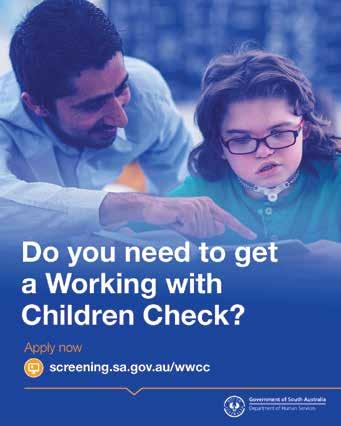
People need a Working With Children Check if they are in a ‘prescribed position’. This means people who are in paid or volunteering roles where it is reasonably foreseeable that they will work with children; run or manage a business where the employees or volunteers work with children; are employed to provide preschool, primary or secondary education to a child.
A Working With Children Check is needed for all schools (Government, Catholic and Independent). For further information go to www.screening. sa.gov.au/types-of-check/new-working-withchildren-checks.

Enthusiastic volunteers are needed to help with various jobs at MTASA events. Tasks include setting up the venue, helping with registration at the check in table, ushering, assisting performers, helping with meals, and packing up afterwards.
It is a great way to network and a volunteering certificate will be provided, which will enhance your CV!
For more information, please e-mail the Secretary at info@mtasa.com.au.
In recent years each issue of SA Music Teacher has included an article about music teaching in a country region of South Australia. There are some regions that haven’t been visited yet. If you haven’t done so please write something – it doesn’t need to be very long – and also include a photo. If you have written something before you are welcome to send an update. E-mail the Secretary at info@mtasa.com.au.
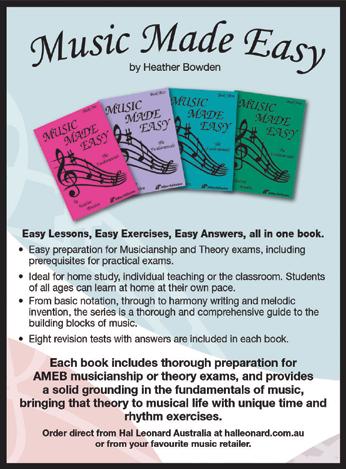
Visit mtasa.com.au/index.php/members/becomea-member/ to join MTASA.
Current Full, Student or Associate Members are not required to submit any supporting documentation to continue their MTASA membership. Anyone applying for Full Membership (either Tertiary Level Qualification and Study or Recognition of Prior Learning and Experience) or Student Membership for the first time must fulfil all of the requirements listed and submit the appropriate supporting documentation. Associate Membership is no longer being offered but those who were Associate Members on September 24, 2017, can continue their membership provided they remain as financial members. Full Membership (Recognition of Prior Learning and Experience) has replaced General Membership.
MTASA Members are always encouraged to write to the Secretary about any concerns that they may have. The MTASA Council will consider your request.
To be listed in the ‘The Directory of Teachers of Music’ on the MTASA website as a teacher of theory/musicianship applicants for Full or Student membership must supply evidence of having completed studies in this field to at least AMEB 5th Grade theory/musicianship standard or equivalent. Full, Student or Associate MTASA members wishing to have theory and/or musicianship included in their Directory listing should send copies of the relevant certificates to the Secretary (info@mtasa.com.au).

The Editor is always looking for things to include in SA Music Teacher. Articles can be about any music related topic. If you would like to write an article this is your invitation! A helpful hint, a comment, a joke, a poem, a cartoon, etc. … please e-mail them to the Secretary at info@mtasa.com.au.
We invite organisations to partner with MTASA on our website. Benefits include advertising via a clickable link and two free tickets to our events for an annual fee of just $100. Please go to our website.
MTASA Members, free. Non-members, $17. Please contact the Secretary (info@mtasa.com.au) about advertising.
 By Yuxin Men
By Yuxin Men
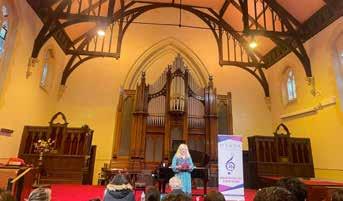

Date: Sunday, 25 June

On Sunday, 25th June the MTASA hosted the second Concert Performance Day for 2023. During the two afternoon sessions we heard 32 performers of all ages and stages, and were pleased to have pianists, violinists, guitarists, and vocalists amongst the groups. Despite the cold afternoon, the atmosphere in the church was welcoming and warm.
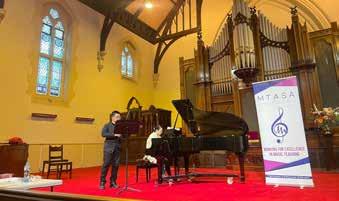
The concert coordinator was MTASA VicePresident Wendy Heiligenberg, and the MC was our President, Sofie Arhontoulis. MTASA Secretary, Elena Shakallis facilitated the event, and the program layout designer was Masako Kondo. The reviewers were Wendy Heiligenberg and Kathleen Lawler for the first session and Rodney Smith (OAM) and Kathleen Lawler for second session. There were 18 performers in the first session. Thirteen pianists, two violinists and three guitarists. Every one of the players had obviously prepared their programs with great care. Some of them were performing for the first time, and, although nervous, they still courageously finished their performances with enthusiasm and flair. At the end of the concert,
Wendy Heiligenberg congratulated the players and encouraged them to make more use of a metronome, which is an essential tool to promote good rhythm and pulse. She also suggested performers take time at the end of the performance to allow the atmosphere of the piece to dissipate before leaping up and leaving the stage.
We were delighted to hear performances from six pianists, five vocalists and two violinists in the second session. I was truly impressed by the performances of the vocalists, who, at such a young age, managed their voices very well, and their stage presence was very professional. Rodney Smith gave some valuable advice at the conclusion of the session. He congratulated all the performers, noting that they were well prepared, and despite not being able to warm up, had all played beautifully. He suggested that the performers work on projecting their sound to the back of the venue, and to try to find the mood and emotion inherent in each work, stressing that music is not just about the written notes.
By participating in the MTASA Concert Performance Day, music students not only get to showcase their talent but also gain confidence and stage presence. The non-competitive nature of these events allows them to focus on their own growth and improvement rather than comparing themselves to others. Moreover, students have the chance to observe fellow musicians from different backgrounds and levels of expertise. This exposure to a diverse range of musical styles and abilities broadens their musical horizons and encourages them to explore new genres or techniques.
In addition, performing in front of an audience helps students develop important life skills such as public speaking, self-discipline, and resilience. They learn how to handle nerves, adapt to unexpected situations, and deliver a polished performance even under pressure. These skills are transferable beyond the realm of music and can benefit them in various aspects of their lives.


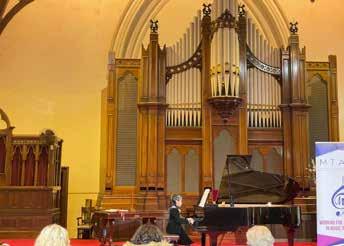


To close the Concert Performance Day 2, President Sofie thanked the performers, reviewers, parents, teachers, and fellow MTASA Council members for their essential contribution to the event.
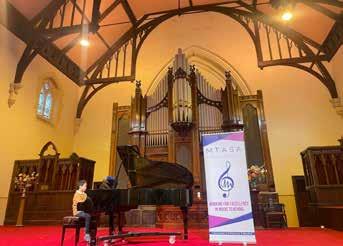
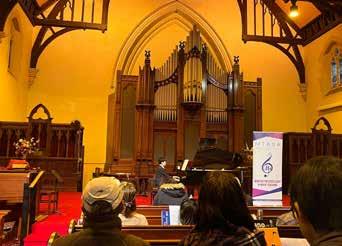
The Volunteers Awards Ceremony held on Thursday the 18th of May from 5:00pm to 7:00pm at Jackson Square was a momentous occasion.
Pete Barter, Sofie Arhontoulis, and Samantha Penny were presented with Volunteer SA Awards by Educators SA for their outstanding contributions to the community.
Pete Barter, Samantha Penny and Sofie Arhontoulis, dedicated volunteers at MTASA, have spent countless hours providing support and assistance to music educators and in providing service to the Music Teachers’ Association of South Australia.
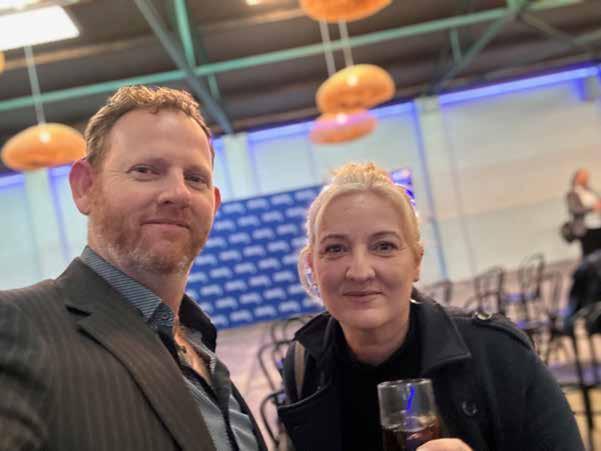
We thank them for their service and appreciate Educators SA’s recognition of their efforts.
 Pete Barter and Sofie Arhontoulis
Pete Barter and Sofie Arhontoulis

On Tuesday 6 June, MTASA President Sofie Arhontoulis attended the Educators SA Vice Regal Reception at Government House with Her Excellency the Honourable Frances Adamson AC Governor of South Australia. It was a welcome opportunity to take a tour through the historic government house and mingle with fellow Association Educators. During the reception, President Sofie Arhontoulis had the chance to engage in meaningful conversations with educators from various associations. The event provided a platform for educators to exchange ideas, share experiences, and discuss innovative teaching methods. The Vice Regal Reception also served as a reminder of the vital role educators play in shaping future generations.


Earlier this year I had a date clash and could not attend the MTA annual professional development day. I decided to submit my own research project for the professional learning requirement.
A couple of years ago I began writing a guide for my instrumental students who study theory with me - third grade chords in 4 part vocal style and some ‘model examples’ of cadences. This gradually expanded, and, working steadily through last year, has now grown to a book on fourth, fifth and sixth grade harmony. I included about 60 musical examples and also 145 pages of solutions to cadence and harmony exercises from various books. I still have more work to do, but I can now see the end in sight.
As source material I went back as far as my school notes and also my tutorial notes from my studies at the Elder Conservatorium. I also used the harmony bible: Harmony and Voice Leading by Edward Aldwell and Carl Schachter.
There are sections for:
1. The chord vocabulary for each grade.
2. A systematic ‘method’, which includes, for example, deciding on the key, whether there is an upbeat, whether there are two phrases, the use of ‘stock’ progressions such as the passing VIIb chord, IV to IVb or I to Ib chords, moving on to what chords to fill in first.

3. A simple but important checklist of what mistakes to look for upon completion.

4. Rules and exceptions. Here I made sure to address in detail consecutive fifths and octaves and the often overlooked exposed fifths and octaves.
5. Chord usage for each level. I focus on explaining the function and use of chords in relation to each other in a way that includes their sound relationship.
Part of the section on exposed fifths and octaves
Exposed fifths and octaves only occur between the soprano and bass parts. They do occur between other voices but are accepted as they do not sound as obvious.
Exposed fifths and octaves occur when the soprano and bass voices move in similar motion to a fifth or an octave (see example eleven). In this example, the soprano and bass parts of the VI chord move in similar motion to the C and G in the bass and soprano parts of the I chord (a perfect fifth). This is forbidden.

The reason why exposed fifths and octaves are forbidden is that the implied movement is of consecutive fifths or octaves (see example twelve). This example “reduces” the exposed fifths of example eleven to the implied form which demonstrates the consecutive fifths (D to A and C to G).
Throughout, I have given context with a focus on sound and musicality. I relate that often, rules – like consecutive octaves – are there as they are considered to sound weak or detract from the sound. Further, I have tried to focus on how and where chords are used in relation to how the end product sounds. For example, when I explain supertonic and subdominant chords, I have included their relationship to the dominant and tonic chords.
I have enjoyed working on this project, particularly listening to music whilst working (hooray for youtube). However, I am not at all looking forward to formatting! At present, the book is in close type, A4 – a rather daunting look for students. I need to add headers and footers and format the entire contents to make it more presentable.
I now have many projects in mind for the future. In typical fashion, I keep avoiding formatting the harmony guide, instead looking at other research ideas.
Once again MTASA is asking its members to consider contributing a presentation at our upcoming Summer Conference, Thursday and Friday January 18/19, 2024, at Prince Alfred College.

As far as teachers are concerned Research, Learning and Teaching are a continuum that requires constant nurture. Sharing is an important mechanism that facilitates this process and letting colleagues know about our current work and ideas through a presentation is an excellent way to do this.
If you haven’t presented before, please don’t be disheartened by the slick, shiny productions we often see onscreen these days. Of course, delivery is important but if you are genuinely excited at some of your teaching discoveries or ideas your listeners will be interested too. If you’d like to discuss something of this nature first, any council member will be delighted to meet and talk with you. Our Conference promises to be interesting, informative and helpful as usual. The Conference Theme “The 21st Century Music Studio” is likely to
be illuminated especially brightly in terms of topics such as teacher wellness and resilience. Our three keynote speakers, Rae de Lisle, Associate Professor of Piano at the University of Auckland, Daphne Proietto, Founder of Keys of Life and Stuart Storer, Lead Examiner of Rock School (Australia), will explore how confidence in teaching instrumental technique, neuro-diverse pupils and pupils seeking a wider variety of musical genres can give added relevance to our studios’ profile and to our work. These are three areas where traditional studios are being challenged and need to move with the times if they are to remain sustainable.
Of course, other topics will have been included by January and furthermore, PAC promises to be an exciting and well-placed venue.
As I write further possible presenters are emerging. Maybe you could be one of them?
21.7.23

Whatever genre of singing you teach, the School Musical may well have cropped up in your lessons. For teachers specialising in music theatre song repertoire, it is even more likely. Well-trained, vocally prepared students are eagerly sought after by those who direct, musically direct and choreograph school musicals. Here are a few ways in which we singing teachers can support, encourage and protect our students when they are faced with the School Musical.
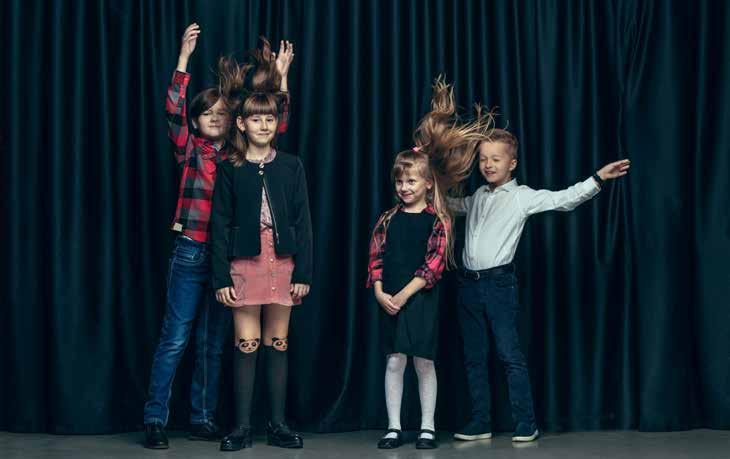
The first thing you hear about it will probably be a bright-eyed, bouncy pupil rushing through the door of your studio, proclaiming:
“They’re doing a musical at my school; I want to audition for it!”
Here’s some questions to ask your student:
a. What’s the show?
If you know the show already, you’re in a much better place to assist your student to prepare for audition.
b. ‘Junior’ version or adult version?
The musical, theatrical, dramatic and vocal differences between The Little Mermaid and The

Little Mermaid, Jr. are massive. Be wary of adult versions of shows, simply because the vocal range they demand can be beyond the healthy singing range for young people, especially those in the middle of vocal transition.
Knowing who the director is may give you useful information about the amount of experience they have working with young, developing voices. Some schools go to remarkable lengths, hiring professional directors and MDs. Some schools simply give their students the experience of performing a full-length musical, directed by the school’s drama teacher and accompanied by a solo piano. Big-budget productions aren’t necessarily the best. People who understand growing voices and can create a safe, inspiring place for their cast to learn and develop as performers are the very best guarantee of a positive School Musical experience.
d.
Unlike professional musical theatre auditions, schools frequently ask the student to sing material from the show. Your student may show you a shred of Shrek Jr. and ask you to help them learn it. Make
sure that you both listen to the whole song, even though you may have a mere 32 bars to prepare. Context is all.
Next stage in this enthralling plot is the day when your student announces:

“I’ve been cast in the School Musical!”
The question this time is:
a. Did you get the role you wanted?
If “yes”, then congratulations are in order. If “no”, ask them how they feel about the role they have been given. This can sometimes be a chance to explain that, although their character may not be the central one, with lots of lines and three solos, preparation and fearless energy will make every one of their moments stand out. How long does King George spend on stage in Hamilton? Remember him?
“I’m rehearsing the School Musical!”
Useful questions at this stage include:
a. Does every singing rehearsal begin with a vocal warmup?
Rule #1 for voice health and safety… but you’ll have already taught your student that.
b. Does your voice feel croaky, painful or strained after rehearsals?
Teach your student to keep a watchful eye on
symptoms… not to become a mini-diva, but just in case the people running the school musical care about young voices less than you do.
c. Does your director or musical director ask you to open your mouth wider, yell louder, or force your voice when a note might be a bit too high for you?
These can be warning signs. If you know your student well, know that they have a well-founded technique appropriate to their age and vocal development, and are confident that they are neither lazy nor inattentive, information like this may sound a warning note.
A final note of caution: if answers to your queries regarding the School Musical raise red flags in the back of your mind, consider advising your student against participating in the show. It is not part of their mandated syllabus. Perhaps your student doesn’t want to participate in the musical as much as their parents want them to. Perhaps the director and/or musical director is unused to working with young people in the throes of voice change; enthusiastic inexperience can cause vocal damage. Care and maintenance of each young and growing voice is a singing teacher’s job. Your advice as a caring professional may not be universally welcomed, but it could save your student’s voice.

See my previous two articles for preparatory steps to this: 1. RH melody with LH chords; 2. RH melody/ chords and LH bass line.

The stride solo piano style evolved in the 1920’s from ragtime, the LH of which was essentially (bass note) Root/chord/R (or 5th)/Chord. The main difference is the wider span between bass note and chord in stride.
An intermediate composition of mine in the style is Giant Strides from Jazzin’ Around 4. This is scaled down to about grade 4-5 to be manageable by students, with single note melody and 3-note LH chords in the A sections. (The bridge melody is more chordal – step 2, and LH a walking bass.) Note the LH chord positions – 2nd finger within about a 2nd or 3rd of middle C, the ideal tonal register, and more uniform for the ‘leap’.

Note: Step 2 chord notes could be added to the melody to achieve a fuller sound; a further step is arpeggiating the LH notes in straight quavers for ballad styles.
Mellow Mood (gr.6) from JA5 is ‘slow and bluesy’ and notated in 12/8 – good practice for ‘swing’ quavers. Note: lots of variations on the basic LH stride pattern as in Ex.2 bar 4, beats 3 and 4, stride pattern reversed – chord/bass note; bars 5 and 6 – LH chord on 2 tied to 3 and LH fill on 4; 3rds in RH fatten the sound.

Ex.3 is an extract from a transcription of the Fats Waller stride classic Handful of Keys*, recorded in 1929. Waller’s LH could comfortably span a 12th – enabling the 10ths and added 6ths at crotchet=248 tempo – with pinpoint accuracy! (Naturally I omit these!) Other techniques to watch for in this performance are LH walking 10ths and octaves; walking single notes between the chords (Ex.4); full RH chord passages; grace and bent notes etc; in LH,1st beat of bar is often the 5th, 3rd beat the root; in the recording – ‘driving’ rhythmic pulse and hard ‘swing’.

https://www.youtube.com/watch?v=0rpAyB15a-g&list=RD0rpAyB15a-g&index=1
In addition to his legendary stride piano playing Waller was also a singer, band leader (‘Fats Waller and his Rhythm’), actor and comedian. He appeared in several movies – stealing every scene.
A more modern style of stride evolved after this period with pianists including:
Art Tatum – Humoresque: https://www.youtube.com/watch?v=qYcZGPLAnHA
Hank Jones – It Had to Be You, with transcription: https://www.youtube.com/watch?v=G_ MJnVCMWBQ&ab_channel=BrettMcDonaldMusic
George Shearing – Yesterdays: https://www.youtube.com/watch?v=BL8yOSojZpI (From his album My Ship– see my review of this in previous article)
Oscar Peterson – I Should Care: https://www.youtube.com/watch?v=J6kUEv8oYl0&ab_ channel=OscarPeterson-Topic
Dick Hyman – Handful of Keys (faster than Fats!): https://www.youtube.com/watch?v=RYocgO3ahhk&ab_ channel=davidhertzberg1

* Transcription by Paul Posnak in Thomas “Fats” Waller, The Great Solos, 1929-1937, published by Hal Leonard – HL.672370
Giant Strides: https://kerinbailey.com.au/music-shop/jazzin-around-4-piano/
Mellow Mood: https://kerinbailey.com.au/music-shop/jazzin-around-5-piano/ https://youtu.be/sM-p26Fuqvw




I last attended an ASME conference in 1999 and much has changed in the intervening years! However thankfully much has also stayed the same; namely the joy of being surrounded by those who are equally as passionate about Music Education.

I renewed my ASME membership last year and being one who loves learning, I was keen to soak in as much as I could at this year’s conference. With days structured around usually 6 timeslots, and each session providing 7 options, there was no way you could attend everything, but gee the choices were fabulous!
My highlights:

Meeting and learning from Paul Harris (UK), who has written so many pieces that my students have enjoyed over the years; he is a delight and a passionate educator! Remember to engage in continual further study and model in a good way ie. ‘telling is not teaching’! ALL students are worthy of our teaching; there are no bad students. Avoid formulaic teaching and remember that a music lesson is an opportunity to develop a student’s esteem, confidence and belief. So powerful.
Meeting Dr Anthea Skinner (not just because of her name!) who spoke so passionately about the role of constructing accessible learning options for young musicians with disabilities.
Hearing from popular musician John Foreman OAM about his educational journey as a child and then at the Sydney Conservatorium (and obviously
his professional highlights too!). His belief that all children need access to a piano (some of us take that for granted!), need the opportunity to attend music camps and that he struggled with reading music. He reminded us not to underestimate what we bring to the world, nor the difference you as music educators make.
Dr Wesley Watkins managed to interweave American politics, jazz and history into an entertaining session where attendees were both entertained and challenged.
Dr Brydie-Leigh Bartleet was one of the most eloquent and passionate speakers I have listened to for a long time. Her words, ‘I can take the time to be creative’ resonated with me.
And as someone who was involved in many choirs as a child and young adult, I completely adored the lunchtime performance of the North Children’s Choir; it truly was mesmerizing. Unsurprisingly, the lunchtime Concert put on by the Royal Australian Navy Band also made my list of highlights; just wow!
The atrium area of the Sydney Con was bustling every day with music teaching professionals networking and there were many exhibitors with items to buy, try or enquire about.
It was a wonderful few days in Sydney, reconnecting with fellow SA music colleagues, old University friends I haven’t seen in years, meeting new faces and being inspired to be a better teacher every day.



Welcome to “Talking Business with Pete Barter,” where we delve into the world of music education and discuss all things related to the music industry. In this column, I’ll aim to provide thought-provoking insights and motivation for individuals in the private music education sector. As musicians ourselves, we understand the creative spirit that drives us, and we recognise the unique privilege we have to positively impact young lives while enjoying fulfilling lifestyles.
The private music education sector is a thriving industry, contributing an impressive 500 Billion dollars annually to the global ecosystem from lessons alone. Surprisingly, this vibrant sector is primarily run by musicians who are often modest about their business acumen. The creative passion driving us may overshadow our business side, but it’s time we recognise that we have the potential to be exceptional educators and entrepreneurs.
We Educators are in a privileged position to do what we love while leading fulfilling lives. Simultaneously, we have the incredible opportunity to empower young minds and foster their growth through music. Music education bestows young learners with superpowers that aid them in becoming well-rounded individuals.
While the arts are celebrated for nurturing creativity, it is scientifically proven that learning music has a profound impact on overall cognitive development. Music education enhances learning abilities and improves cognitive functions, making students better learners in various domains. Numerous successful professionals attribute their achievements and fortunes to their early musical training.
In the private music education sector, musicians have a unique advantage of earning a decent above-average wage while doing what they love. As of 2023, the Australian median salary is approximately $79,800 (according to the Australian Bureau of Statistics), which highlights the promising potential for a prosperous career in music education.
For those following the MTASA’s recommended teaching fee of $40 per 30-minute lesson, achieving a substantial income becomes attainable.

To earn around $79,800 per year, a music educator would need to teach approximately 24 hours per week, (48 30-minute lessons per week.)
This demonstrates how successful teachers can leverage their skills and passion to secure a comfortable income within the private music education sector. Think about group workshops, online self guided training modules, self published learning materials or equipment. Plus gigs.
Supplementing their earnings through performances and gigs is a common practice. Gigs, in particular, can contribute significantly to a musician’s income, adding an extra $20,000 to $40,000 AUD per year on the lower end, depending on the frequency and demand for performances.
Achieving a $100,000p/y income or more from music education requires more than just musical proficiency; it necessitates business knowledge and an entrepreneurial mindset. Musicians who embrace these qualities are better equipped to thrive financially while doing what they love. By recognising the value of both artistry and business acumen, we elevate the professionalism of our “cottage industry,” contributing to its growth and success.
As famously described by Malcolm Gladwell in his book “Outliers,” the 10,000-hour rule suggests that it takes approximately 10,000 hours of practice to achieve mastery in a particular field. For musicians, this principle holds true, as mastering an instrument or musical skill requires an extraordinary amount of dedication and practice.
With over 20,000 hours invested in honing their craft, a seasoned musician has undoubtedly surpassed the 10,000-hour mark, solidifying their position as a masterful musician and educator. By sharing their wisdom with the next generation, they extend the value of practice beyond performance time, guiding aspiring musicians on their own paths to excellence.
In “Talking Business with Pete Barter,” I celebrate the dynamic world of music education and encourage our fellow musicians to embrace their entrepreneurial potential. The private music education sector not only offers the potential for a prosperous career but also enables musicians to share their passion and knowledge with aspiring students, enriching lives through the power of music.
As musicians, we recognise the significance of practice, dedication, and the fusion of creative and business skills. By adopting a professional
and entrepreneurial mindset, we elevate the professionalism of our “cottage industry.” Even if earning substantial income isn’t the primary goal, acting in a business-like manner contributes to the overall success and sustainability of the private music education sector.


Providing music education is not only essential for society’s enrichment but also offers a fulfilling and rewarding career path for musicians.
Through dedication to our craft, we attain mastery that paves the way for exceptional teaching and inspiring performances that resonate with generations to come. As we continue to nurture the next generation of musicians and music enthusiasts, we empower them to reach their full potential and embrace the transformative power of music.

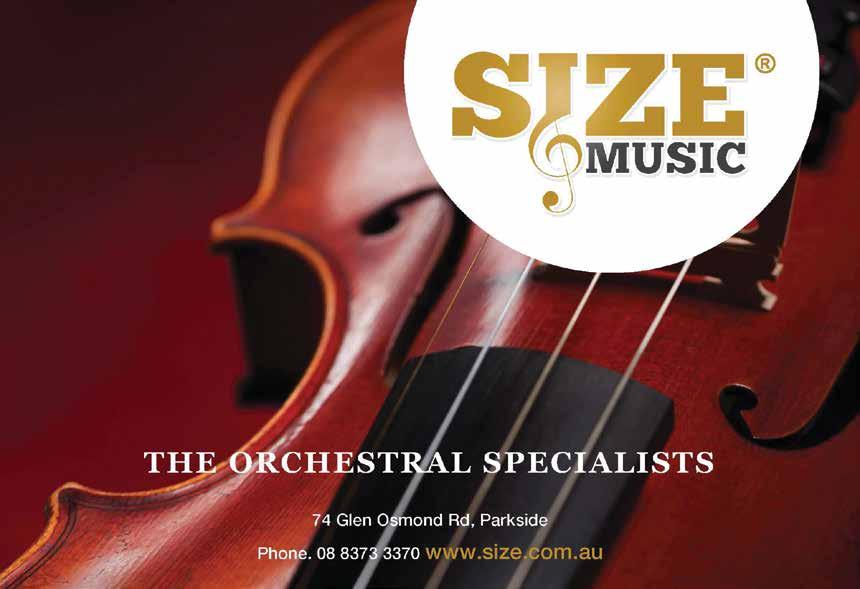
Let’s strive for excellence, both as educators and entrepreneurs, to shape a brighter future for ourselves and our students. Together, we can propel the private music education sector to new heights and make a lasting impact on the lives of countless individuals through the timeless art of music. By combining our creative passion with business acumen, we can unlock the true potential of the private music education sector and
students alike. Let’s keep talking business, sharing insights, and motivating one another to do better as individuals, ultimately elevating the entire music education sector and leaving a lasting legacy of success and inspiration for generations to come.
A note from Monika!
I began the Accompanist’s Corner some years ago, while still on the MTASA Council, aiming to shine a light on our local accompanists and asking them to tell their stories, which have certainly been most interesting to read! Today, wearing my AMEB hat as well as my AGSA hat – supporting both very worthwhile causes - I thought it was time to say a few words about………….
The AMEB has in recent years been quite enterprising, innovative and more widely inclusive of all kinds of music - creating several new ‘streams’ in exam requirement. We’ve seen the arrival of a Leisure Syllabus, a PPlate series, a performance of Repertoire only, a Syllabus for Theatre, Rockschool and the offer of a very generous Accompanist Prize quite apart from all the other usual grade prizes; NOW we have the Collaborative Exams!
Unfortunately the whole ensemble syllabus was withdrawn for reasons which are unclear – possibly the extra complication in the examining process, or the need for enough examiners who were experienced not only in solo performance???


In 2019, thanks to one inspired musician on the AMEB Board, (unknown, though I’m guessing!), an updated equivalent - the Collaborative Exam –was introduced, not for trios but the more easily managed duos.
Our piano students from Gr.5-8 can now choose to include a duo work in their exam programs. They can perform with violin, flute, clarinet, or as a piano duet; the repertoire available has been chosen with care for both instruments.

It means they can prepare a work with a friend/ colleague/sibling, having a lot of fun in the learning process and entering the exam not alone but in company.
Surprisingly, it seems that not many have taken up this opportunity – I can’t imagine why!!!! - Of course there ARE a few logistical issues to be considered by parents. Unless the duo is formed by siblings, suitable ‘partners’ for the candidates have to be found and rehearsals facilitated. However I’ve seen, through my experience with AGSA’s JEM* and YAS** concerts, that most parents are already so used to being ‘taxi-drivers’, transporting their children to music lessons etc., that they don’t mind the ‘extra mile’. They appreciate the value of such an activity for the young musicians!
Ensemble playing alerts and introduces young pianists to a much wider world of music-making with exciting new repertoire. It teaches them to share musical ideas, improves rhythmic and aural awareness, provides the opportunity to form new friendships.…possibly even creating an ongoing musical partnership!
Teachers! All the relevant information is in the current Manual and the music is easily accessible. Think of how refreshing it could be to prepare a duo work in your lessons……….not to mention the added enthusiasm you might see in your students!


*Junior Ensemble Musicians, **Young Accompanist Showcase



MUSIC TEACHER

Dates Venue Website
: : :
8-12 July 2024

Monash University, Melbourne appca.com.au
MITCHAM ORCHESTRA
Rehearsals Venue Contact Ph. Email
: : SA
: : : : :
The Mitcham Orchestra is looking for lower strings, Oboe and Horns. Saturday afternoons 1.30pm – 4.15pm
Cumberland Park Community Centre, 390 Goodwood Rd, Cumberland Park
Ros Keynes
8390 3053 rosalind@keynes.id.au
2023 INSTRUMENTAL/VOCAL Music Scholarship-2023

Metropolitan Male Choir of South Australia Inc. www.mmcsa.org/about/music-scholarships/
The Metropolitan Male Choir Y2023 music scholarship program for solo Instrumental/Vocal performance, is offered to young people with proven musical ability. Applicants must be 12 to 16 years of age on January 1, 2023.
RECITALS AUSTRALIA WEDNESDAY LUNCH HOUR SERIES 2023
Tickets : $10 or online via website, Facebook, or Vimeo for free.
Enquiries : Ph. 08 8236 7488
Website : www.recitalsaustralia.org.au for more information.
ELDER CONSERVATORIUM OF MUSIC CONCERT SERIES 2023
Lunchtime Concerts
Evening Concerts
Website : www.able.adelaide.edu.au/music/engage/concert-series
Contact : For booking and enquiries: Tel: +61 8 8313 5925
Email : concertmanager@adelaide.edu.au
ADELAIDE SYMPHONY ORCHESTRA
Check their website for the upcoming concerts and support our local orchestra!
Website : www.aso.com.au/concerts-tickets/whats-on/ www.musicaviva.com.au/concert-season/
MUSICA VIVA
Tuesday on Flinders
Time : 1:00 pm
Entry : Free
FLINDERS STREET BAPTIST CHURCH
Website : www.fsbc.asn.au/concerts/
NORWOOD SYMPHONY ORCHESTRA
Venue : Norwood Concert Hall
Tickets : Adult $20, Concession $15, Children Free
Website : www.norwoodorchestra.com/
BURNSIDE SYMPHONY ORCHESTRA
Venue : Burnside Ballroom, 401 Greenhill Road, Tusmore 5065

Tickets : $20 Please purchase online
Website : www.bso.org.au/concerts-2021/
5MBS: MUSIC BROADCASTING SOCIETY OF SA
www.5mbs.com
8346 2324
5mbs@5mbs.com
4A River Street Hindmarsh SA 5007
AUSTRALIAN BAND AND ORCHESTRA DIRECTORS’ ASSOCIATION (ABODA): ABODA SOUTH AUSTRALIA www.abodasa.com.au info@abodasa.com.au
ABODA SA
C/-PO Box 327 Walkerville SA 5081
ABRSM EXAMINATIONS
www.us.abrsm.org/en/home
SA Rep.: Anastasia Chan 8234 5952/0423 282 589 abrsmsa@hotmail.com
ACCOMPANISTS’ GUILD OF SA INC. www.accompanist.org.au
President: Leonie Hempton OAM 8272 8291/0404 145 502 leoniehempton@gmail.com
ADELAIDE BAROQUE
www.adelaidebaroque.com.au
8266 7896
0400 716 554 General Enquiries manager@adelaidebaroque.com.au 10 Clarence Avenue, Klemzig SA 5087
ADELAIDE CHAMBER SINGERS
www.adelaidechambersingers.com/ +61 8 8352 1329 admin@adelaidechambersingers.com
ADELAIDE EISTEDDFOD SOCIETY INC. www.sacoment.com/aes/eisteddfod/
Secretary: Jane Burgess adleisteddfod@adam.com.au jane@janeburgess.com.au
ADELAIDE HARMONY CHOIR www.facebook.com/adelaidephilharmoniachorus/
Secretary: Sherry Proferes adelaideharmonychoir.info@gmail.com
ADELAIDE PHILHARMONIA CHORUS www.philharmonia.net/
ADELAIDE YOUTH ORCHESTRAS www.adyo.com.au/
8361 8896
Executive Director: Ben Finn claire@adyo.com.au
AMEB EXAMINATIONS: SA AND NT www.sa.ameb.edu.au/ 8313 8088 ameb@adelaide.edu.au
AUSTRALIAN NATIONAL ASSOCIATION OF TEACHERS OF SINGING (ANATS) ANATS: SA AND NT CHAPTER www.anats.org.au/sant-chapter
Secretary: Dianne Spence anats.sa.nt@gmail.com 0435 300 070 admin@anats.org.au
ANZCA EXAMINATIONS
www.anzca.com.au
(03) 9434 7640 admin@anzca.com.au
AUSTRALIAN SOCIETY FOR MUSIC EDUCATION (ASME) ASME: SOUTH AUSTRALIA CHAPTER www.asme.edu.au/sa/ President: Luke Gray graylu@trinity.sa.edu.au asme@asme.edu.au
AUSTRALIAN STRINGS ASSOCIATION (AUSTA) AUSTA: SA CHAPTER www.austa.asn.au/chapters/sa/ President: Fiona Patten fionapattenausta@gmail.com +61 439 885 754
AUSTRALASIAN DOUBLE REED SOCIETY www.adrs.org.au
Contact: Josie Hawkes OAM josie.bassoon@gmail.com
AUSTRALIAN STRING QUARTET
www.asq.com.au/ 1800 040 444 asq@asq.com.au
BALAKLAVA EISTEDDFOD SOCIETY www.balaklavaeisteddfod.org.au
Contact: Trish Goodgame 0417 891 834 info@balaklavaeisteddfod.org.au
CON BRIO EXAMINATIONS
www.conbrioexams.com 9561 3582 / 0401 014 565 lily@conbrioexams.com
ELDER CONSERVATORIUM OF MUSIC www.music.adelaide.edu.au/ 8313 5995 music@adelaide.edu.au
ELDER HALL
www.music.adelaide.edu.au/concerts/ 8313 5925 concertmanager@adelaide.edu.au
FLUTE SOCIETY OF SA INC. www.flutesocietyofsa.org
Secretary: Catherine Anderson secretary@flutesocietyofsa.org
INSTRUMENTAL MUSIC: DEPARTMENT FOR EDUCATION
Instrumental Music Office - Klemzig 8261 8988
IM.KlemzigOffice608@schools.sa.edu.au
Instrumental Music Office - Morphett Vale 8392 3800
IM.MorphettValeOffice896@schools.a.edu.au Music Programs 8226 1883 education.musicprograms@sa.gov.au

KODALY MUSIC EDUCATION ASSOCIATION OF SA www.kodalysa.com/ 0405 066 469 kodalysa@gmail.com
MUSICA VIVA
www.musicaviva.com.au for concert details
Box office: 1800 688 482 contact@musicaviva.com.au boxoffice@musicaviva.com.au
MT GAMBIER EISTEDDFOD
www.backstageinc.org.au
Secretary: Maxine Chalinor 0457 067 555 tonymaxine@internode.on.net
MUSICIANS’ UNION OF AUSTRALIA ADELAIDE BRANCH
www.musiciansunion.com.au/ 8272 5013 industrial.officer@musicians.asn.au Federal Treasurer-Sam Moody 0412933865 musosa@bigpond.net.au
ORFF SCHULWERK ASSOCIATION OF SA www.osasa.net/ info@osasa.net
PRIMARY SCHOOLS MUSIC FESTIVAL www.festivalofmusic.org.au
8261 5438 office.psmf799@schools.sa.edu.au
RECITALS AUSTRALIA
www.recitalsaustralia.org.au 8236 7488 info@recitalsaustralia.org.au
ST CECILIA EXAMINATIONS PTY. LTD. www.st-cecilia.com.au
1800 675 292 info@st-cecilia.com.au
SOUTH AUSTRALIAN BAND ASSOCIATION
www.sabandassociation.org
Secretary: David Corkindale secretary@sabandassociation.org
SOUTH AUSTRALIAN MUSIC CAMP ASSOCIATION
www.samusiccamp.com.au
Administrator: Samantha Taylor admin@samusiccamp.com.au
THE SOCIETY OF RECORDER PLAYERS SA INC. www.facebook.com/recorderplayerssa/ 0410 109 135 srpsainc@gmail.com
TRINITY COLLEGE LONDON EXAMINATIONS
www.trinitycollege.com.au
1300 44 77 13: National
Mr Stanley Tudor 8345 3117: Local stanley.tudor@iinet.net.au
UKARIA CULTURAL CENTRE www.ukaria.com
8227 1277 info@ukaria.com



